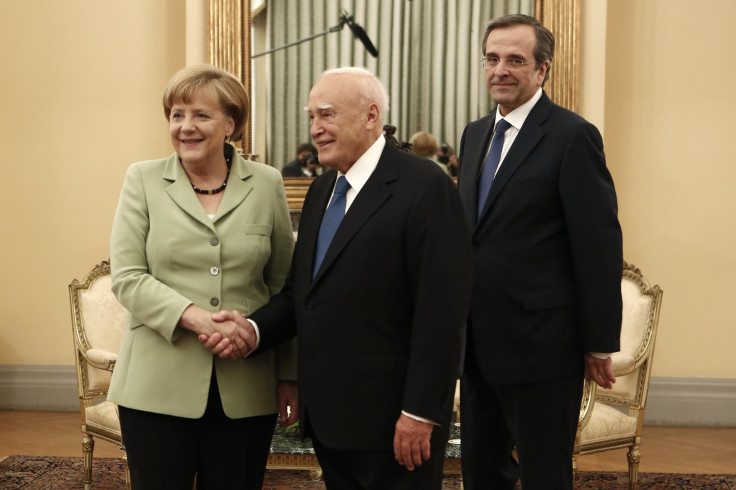In Most Delicate, Dangerous Trip, Angela Merkel Visits Greece

German Chancellor Angela Merkel embarks Tuesday on what is essentially a visit to enemy territory, touching down in Athens to meet with the Greek political leadership and deliver a message of "solidarity" with the Greek people.
The visit is personally dangerous to Merkel, a political figure who is reviled in Greece as a personification of the forces imposing painful austerity measures. A security plan meant to ensure her safety includes the deployment of 7,000 police officers, two combat helicopters and hundreds of snipers across scores of rooftops. The police will erect six-foot-high metal barriers outside Parliament, and have a water cannon on standby to deter protestors, a state-owned television report said.
In a move that the Athens Bar Association said Monday was a violation of the national constitution and "evoked other eras" -- a thinly veiled reference to the 1967-74 military dictatorship -- the government also declared it was suspending the right to free assembly in a wide strip of central Athens that follows the road from the airport to the presidential palace.
All those preparations don't necessarily that mean Merkel, who is stepping into a city where where violent protests include effigies of her on a nearly daily basis and tabloid newspapers that print altered photographs that feature her sporting a Nazi uniform, won't be in for a rude reception.
Greece's two major labor unions are calling for a work stoppage at 3 p.m. and massive demonstrations at 6 p.m. just outside the security perimeter.
"She does not come to support Greece, which her policies have brought to the brink. She comes to save the corrupt, disgraced and servile political system," Alexis Tsipras, who leads the opposition Syriza alliance, said in a speech over the weekend. "We will give her the welcome she deserves."
A "normal visit"
None of that has made the German government, which announced the trip casually as a "normal visit" during a regular media briefing last Friday, sweat a single drop. On Monday, Merkel said she expected a conversation with Prime Minister Antonis Samaras would lead to "constructive and friendly discussions in the light of expectations that we have of Greece."
German Foreign Minister Guido Westerwelle had similarly toned down the rhetoric on the visit earlier, describing it as "a European gesture, an act of acknowledgment of the Greek government, which is under great pressure with its reform policy."
The German media, for their part, have interpreted Merkel's trip as the latest leg of her "charm offensive," which has seen the chancellor soften her image among the people of Spain and Italy by visiting those countries to speak about their "friendship" with Germany, acknowledging the "great sacrifices" caused by austerity measures, and noting the progress governments have achieved in pursuing fiscal discipline.
"She is going to Greece to express her support to the Greek government for the very demanding reform course that it has decided on and, in part, has begun to implement," Merkel's spokesman, Steffen Seibert, told London's Daily Telegraph. "She knows that the country faces very demanding and painful tasks."
"A significant chance of backfiring"
But Merkel's Greek trip is somewhat more complicated than earlier ones to Spain and Italy. The Greek government is negotiating with three agencies that provided it with a sovereign bailout last year, asking them to release 31 billion euros (US $41.9 billion), despite not yet achieving promised austerity cuts.
Many believe Samaras will use his meeting with Merkel to beg -- or demand -- more leniency in implementing austerity programs. And Merkel might not find it so easy to just say no.
In a note to clients, JP Morgan Chase economist Alex White noted that, while Merkel would be the more powerful person in the room in a meeting with Samaras, the Greek leader would still have some leverage since "there is a widespread recognition that he is likely the least bad leader that Greece has on offer, and that it is in Germany’s interests not to test Greece’s political system any further." White noted that Merkel’s visit, inasmuch as it is designed to bolster Samaras, has "a significant chance of backfiring."
And that's assuming Samaras stays away from public histrionics, something he did not do last week when he told German business daily Handelsblatt that Greece is in a historical period akin to that of the Weimar Republic, a step away from devolving into fascism.
"People know that this government means Greece's last chance. We will make it. If we fail, chaos awaits us," Samaras said then.
It wouldn't be the first time Merkel faced an awkward situation on a foreign trip. In Madrid last month, the media noted that Merkel looked displeased and kept motioning to her watch after various titans of industry exceeded their time limit during presentations asking for more forceful aid to the Spanish banking system.
No "presents"
A final complication to Merkel's trip is the fact that, while engaging on an exercise designed to soften her image and show empathy, she is being pushed by concerns at home to remain firm in her previous policy positions. In a statement Monday, government spokesman Seibert stressed that previous agreements Greece has acceded to "also include timetables." If that's a blueprint for what Merkel plans to tell Athens, that means Merkel is unlikely to support even the softest of Greek petitions: a request to delay -- but not discard -- austerity reforms.
Toeing the same party line, Volker Kauder, head of Merkel's parliamentary group, told German magazine Der Spiegel Monday that "the visit isn't intended to bring any presents for the Greeks."
Not that anyone expects friendly offerings of that kind.
In Athens, where it has suddenly become fashionable for newspapers to remind people that the Axis invasion of Greece began in October 1940, the word on the street is to fear the Germans, even those bearing gifts.
© Copyright IBTimes 2024. All rights reserved.





















